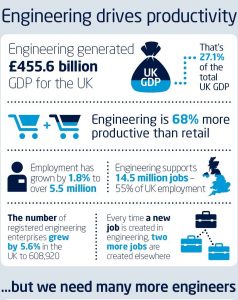Engineering companies will have more than 1.5 million vacancies to fill over the next six years and the UK needs now to work on providing the skills that would help fill them.
Engineering UK (EUK), a not-for-profit organisation that promotes the vital role of engineers in the community, says that annually 186,000 of those workers would be people with engineering skills.
Paul Jackson, EUK’s chief executive, says it works with employers to inspire school-aged students, particularly girls, who are choosing GCSE’s and ‘A’ levels, especially encouraging them to take maths and physics – subjects that could lead to engineering careers.
“Young people are presented with very narrow choices when it comes to choosing subjects and that affects their career possibilities” he told Chief-Exec.com yesterday.
“… We have to work for the long-term, to have a broader curriculum. The days of preparing for one job are long gone. Our young people need practical skills, as well as the academic.”

Credit: EUK
Engineering a future outside the EU, a report released late last month by the Royal Academy of Engineering, said the UK faced a serious engineering skills crisis, which could be exacerbated if access to the European engineering workforce becomes more restricted.
“Training apprentices to the level that engineering businesses require takes time,” the report said.
“… The result of the EU referendum and the development of an industrial strategy for the UK create an imperative to refocus efforts on boosting the supply of UK home-grown talent to tackle the skills crisis.”
Mr Jackson said engineering is important to our everyday lives – from essentials like running water, transport and power generation through to mobile phones, broadcasting and broadband internet.
“It’s also crucial to the UK economy, contributing £1.21 trillion in turnover in 2013-14, the latest figures available, or 24.8 per cent of the turnover for all businesses,” he said.
“The sector employs 5.5m people across 608,920 engineering companies. UK manufacturing is very much alive and well and is one of the most productive in the world.”
Mr Jackson said there had been a significant move in young people’s knowledge of engineering and the type of jobs that are available – from building a bridge to 3D printing and wearable tech – but young people had to be trained to a higher level to ensure continued innovation and excellence.
The Report of the Independent Panel on Technical Education published earlier this year suggested that a transition year be introduced for young people not ready to access a technical education, such as an apprenticeship.
Mr Jackson said the transition year could be extended to also apply to the adult workforce, to 35-40-year-olds, especially those struggling with English and maths.
On the new apprenticeship levy that will be introduced in April, he said there was concern among some in the industry that the government was looking more at the numbers rather than the quality of apprentices.
“We have to be able to get apprentices into all parts of the supply chain, we need to bridge the world of work and education,” Mr Jackson said.
“We have to make sure that employers don’t see the levy as a tax.
“There are a lot of job multipliers from engineering. When you fill a skilled vacancy you get two more jobs in the economy. These are high-cost courses, but they are also income generators.”
By Aban Contractor




